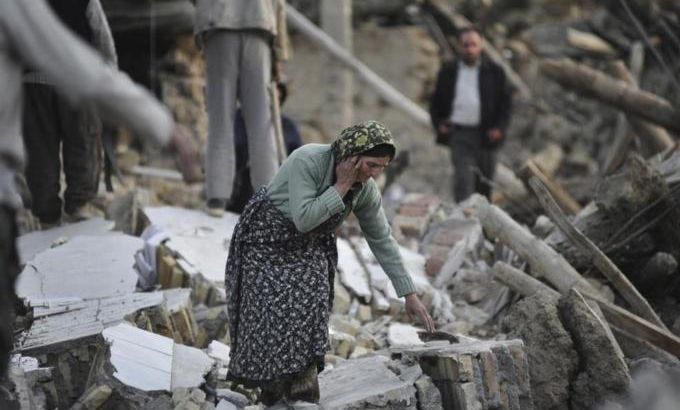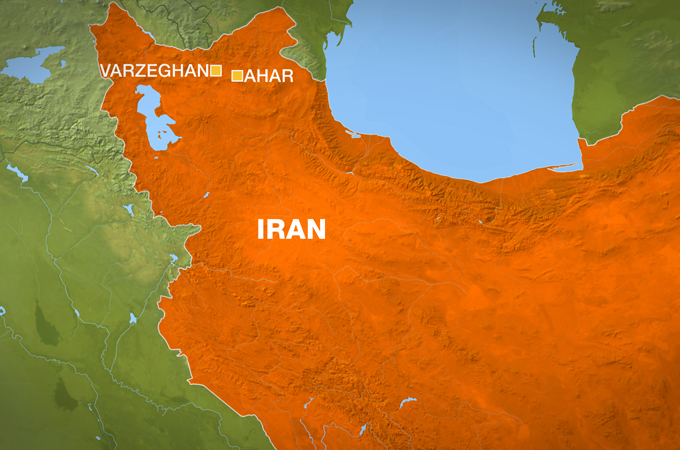Tehran criticised over earthquake response
Government response and attitude denounced by public and parliamentarians, although foreign aid will now be accepted.

Iran’s government has been criticised over its response to two earthquakes that killed at least 306 people, with complaints of a lack of tents and about President Mahmoud Ahmadinejad’s decision to go ahead with an overseas trip.
Members of parliament representing the affected areas complained about a shortage of tents, parliamentary news agency ICANA said on Monday.
Keep reading
list of 4 itemsCould shipping containers be the answer to Ghana’s housing crisis?
Thousands protest against over-tourism in Spain’s Canary Islands
Holding Up the Sky: Saving the Indigenous Yanomami tribe in Brazil’s Amazon
“The crisis management headquarters must take broader steps to alleviate these concerns,” said speaker Ali Larijani, a frequent critic of Ahmadinejad and possible candidate to succeed him in elections next year.
Vice President Mohammad Reza Rahimi, however, announced emergency funds for the relief effort and appeared to indicate the government had not reacted quickly enough.
“In these conditions, any criticism the people have of us is acceptable and we must all work as hard as possible for their sake,” he told the Mehr news agency.
 |
| Several villages near Ahar and Varzeghan were destroyed by the earthquakes on Saturday that killed over 300 people[Al Jazeera] |
The moderate conservative newspaper Asr-e Iran reported that two days after the earthquakes, some villages had not yet been visited by relief teams.
Three days after the twin quakes struck, most villages still had no electricity and drinking water, the official IRNA news agency reported.
Several Iranian blogs and news sites have criticised Ahmadinejad for not visiting the affected areas and leaving the country for a meeting of the Organisation of Islamic Co-operation in Saudi Arabia without issuing a statement of condolence or support to the earthquake survivors.
In an interview with a Farsi-language radio show in France, journalist Solmaz Ekdar, who is reporting from several villages between Varzeghan and Ahar, said there was “improper oversight” of aid distribution.
“Unfortunately, in Ahar, we saw trucks parked on the side of the road loaded with water, canned foods and fish, and then we would see people [nearby] dying of thirst for a drop of water,” said Ekdar, adding that while in some places survivors were given enough food, that in most cases, people were doing without the necessities.
“Medicine, water, food, blankets and blood – blood is very important,” said Ekdar.
“Iran, during the month of Ramadan, is always low on blood because people are fasting. And now, these earthquakes have coincided with this shortage and people are facing difficulties.”
Survivors found
IRINN, a state news agency, reported that two people were found alive from the rubble on Tuesday, three days after the earthquakes stuck, even though less than 24 hours after the disaster, the government announced that it was halting search operations.
Some locals expressed disbelief that authorities could have reached the most remote villages so soon.
“I know the area well. There are some regions where there are villages that you can’t even reach by car,” one doctor in the city of Tabriz told Reuters by telephone on Monday.
“It’s not possible for them to have finished so soon.”
Some also suspect that the death toll is much higher that the official number, which currently rests at just over 300. Ahar’s chief coroner told Ahar, told official news agency IRNA that the number of dead could be over 1,000.
Foreign aid
Vice President Rahimi said that Iran was ready to accept international aid, something the government had refused to accept earlier.
“In different situations, our country has helped those in need in other countries and under the current conditions, is ready to receive aid … from different countries,” IRNA reported Rahimi as saying on Monday, without giving any details.
Iran’s Red Crescent said on Monday the country did not need foreign assistance and sent back a rescue team from Turkey that arrived without advance coordination.
Iranian authorities say they have accommodated some 50,000 people who lost their homes during the quakes, which have been followed by scores of aftershocks.
In the aftermath of the quake, the US, Russia, Turkey and a host of other nations offered their condolences and said they were ready to offer assistance.
The US said on Monday that its citizens can donate food and medicine to Iran without fear of prosecution.
“Our hearts go out to those people who are affected,” State Department spokeswoman Victoria Nuland told reporters.
“Americans wishing to provide humanitarian assistance to Iranians during this time may donate food and medicine without obtaining an Iranian transactions regulations license,” she said, referring to sanctions exemptions.
In addition to killing at least 306 people, Saturday’s magnitude 6.4 and 6.3 quakes also injured more than 3,000people in an area bordering Azerbaijan and Armenia. Iran had announced two days of mourning for those who died in the earthquakes.
Dozens of aftershocks and another earthquake – a magnitude 5.3 quake, which hit Varzegan on Tuesday – have continued to unnerve people in northwest Iran. Fars news agency reported that the latest quake, felt in Tabriz, had caused “horror” there, sending people into the streets.
Iran sits astride several major fault lines and is prone to frequent earthquakes, some of which have been devastating.